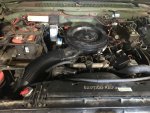I found this interesting...
replacement items and replaced with new parts during assembly/installation.
Section II. EQUIPMENT DESCRIPTION AND DATA
1-10. DESCRIPTION
The engine used in the M998 series vehicles is an eight-cylinder, four-cycle, liquid-cooled, naturally
aspirated diesel engine. The 6.2L engine has a compression ratio of 21.5:1 and develops approximately 150
horsepower (112 kW) at 3600 rpm. The 6.5L engine has a compression ratio of 21.5:1 and develops
approximately 160 horsepower (119 kW) at 3400 rpm. For proper orientation, the left and right sides of the
engine are as viewed from the rear.
1990 and above 6.2L and 1994 6.5L engines have the following new and revised parts:
*Cylinder Heads.
The 1990 cylinder heads have been revised to meet 1990 emissions standards.
Precombustion Valves.
The 1990 engine is equipped with reverse throat precombustion chambers.
Exhaust Valves.
The 1990 exhaust valves are coated with chrome to prevent burning and to
increase durability.
*Exhaust Valve Stem Seal.
The 1990 engine is equipped with a new exhaust valve stem seal that
is not available for previous model engines.
Cylinder Head Gaskets. The 1990 cylinder head gaskets have new circular combustion seals and
are made of a non-asbestos material.
Fuel Injection Pump.
The 1994 fuel injection pump has a TP sensor and a revised calibration
procedure.
Fuel Injection Pump.
The 1990 fuel injection pump has a new governor and a revised calibration
procedure.
*Fuel Injection Nozzles.
The 1990 fuel injection nozzles are shorter and are orientated ten degrees
from the vertical.
*Fuel Injection Lines.
The 1990 engine is equipped with high pressure fuel injection lines.
Fuel Injection Line Brackets.
The 1990 fuel injection line brackets have been revised to provide
clearance for the injection nozzles.
*RPM Sensors.
The 1994 engine is equipped with two rpm sensors. One is for STE-ICE-R and one is
for the engine.
*Fan Cut-Off Switch.
The 1994 engine is equipped with a fan cut-off switch which replaced the
kick-down switch.
*These 1990 parts are not interchangeable with parts for previous model engines. Differences in
maintenance procedures are identified where applicable. Refer to engine decal number on left rocker
arm cover before ordering replacement parts.
1-



